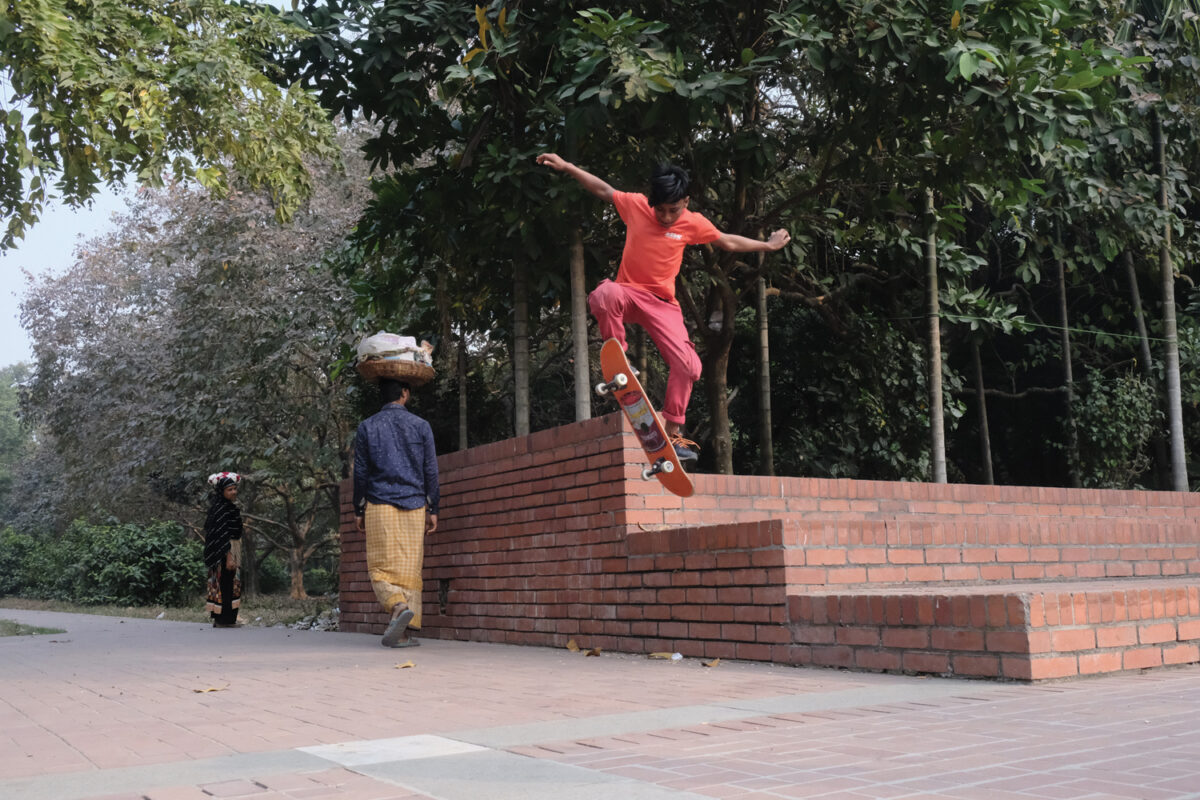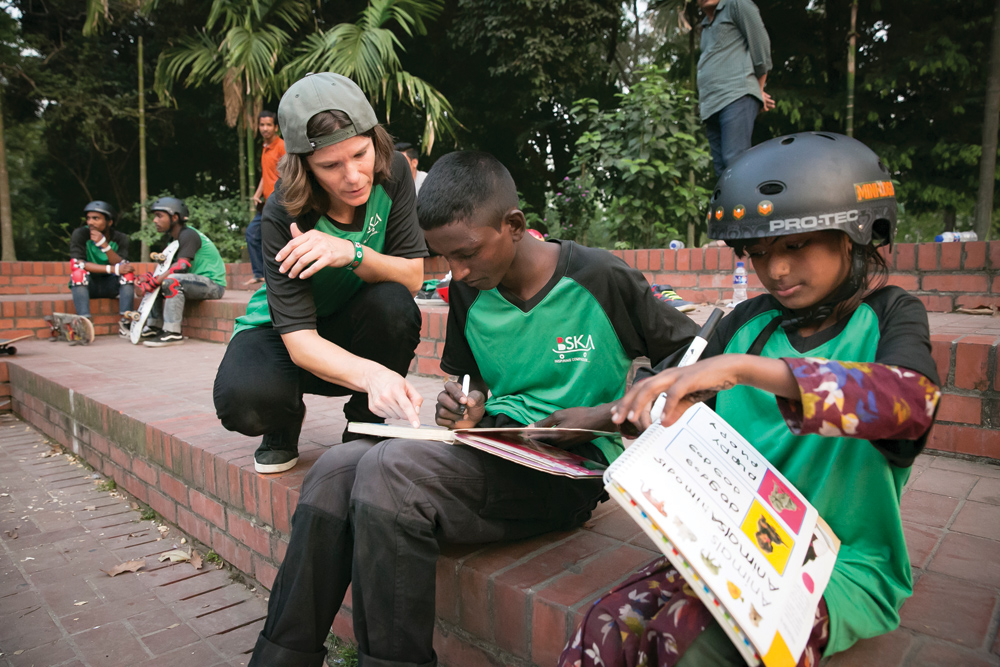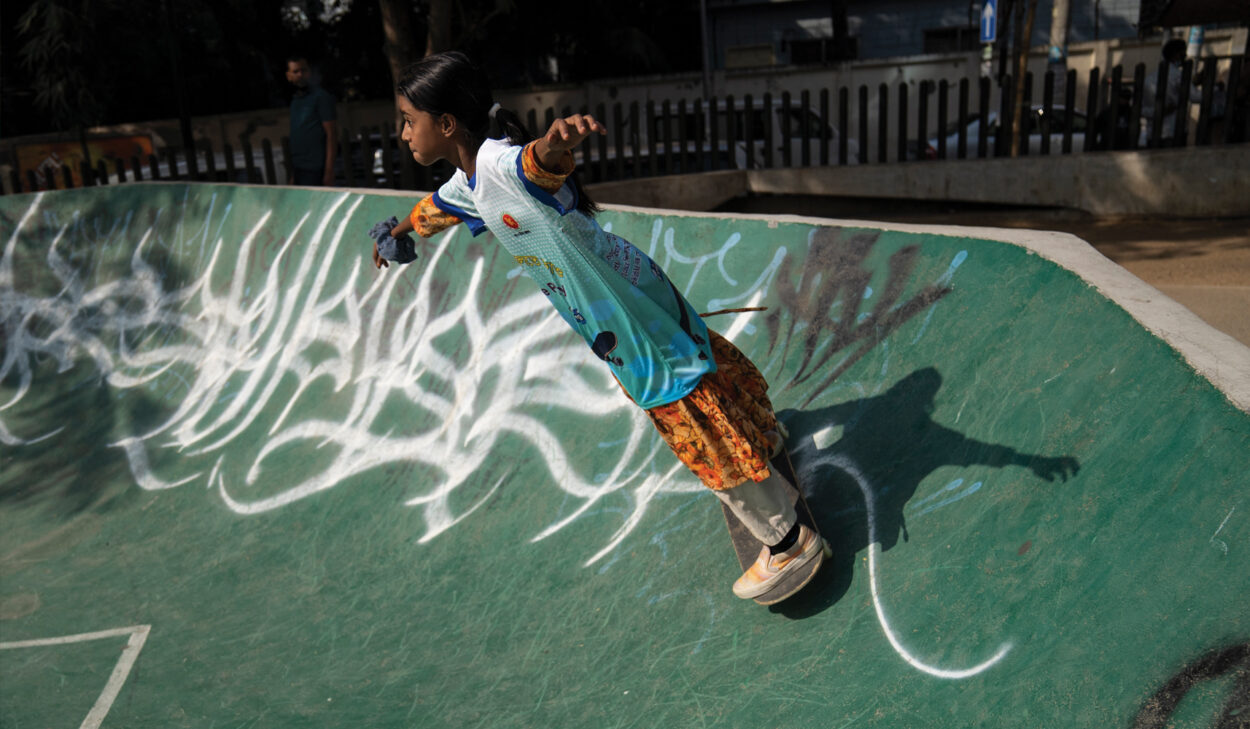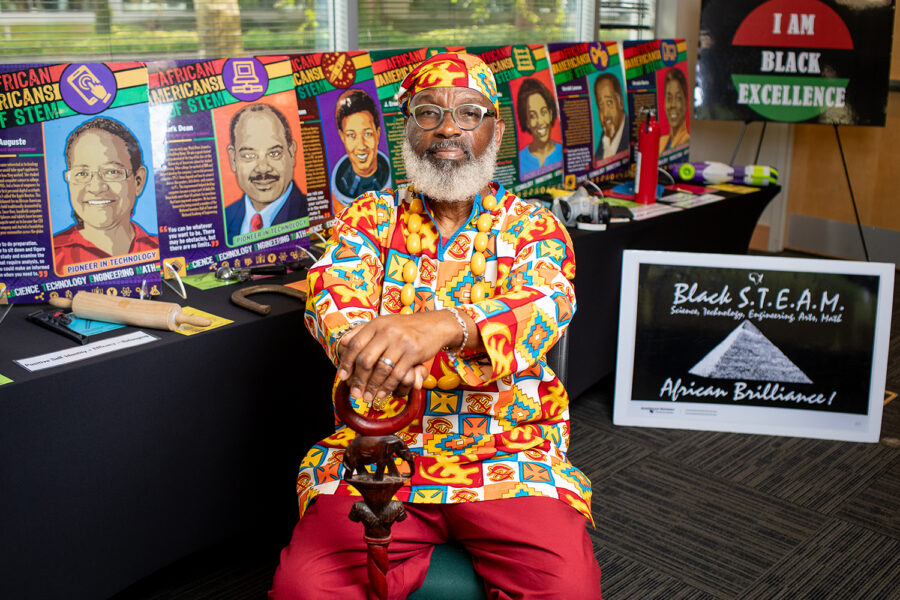Like many big, openhearted attempts to make the world a better place, the first trip that Susie Halsell ’18, ’23 (Santa Barbara, BA; Online, MA) made to Bangladesh with the intention of helping impoverished kids was a bit optimistic. As she explains, “I was thinking I had a lot to offer, when all I had was a couple thousand dollars and a bag of skateboards.”
She was 21 years old, and what she found when she stepped off the plane ended up changing the course of her life. Drawn to where her help would be most needed, she visited slums where trash paved pathways over open sewers and poor air quality, water quality, and waste management made daily life unpleasant and dangerous for those who made their lives there. Most heartbreaking of all were the children she met who lived in the streets, many of whom engaged in begging, prostitution, and drug use. She was especially horrified to learn how many of the young girls she met were headed for child marriage.
When she went home to Santa Maria, California, her perspective on the world and her place in it had changed entirely. “Holy crap,” she says. “I wanted to kiss the ground.” But she didn’t remain long in the relative safety of the U.S. Instead, she returned to Bangladesh again and again. Unable to get these resource-deprived children out of her mind, she worked to build trust with them and to find ways to improve their circumstances. At the start, she did this by providing financial help through her own resources. And all along her main tool was the skateboard.
According to Halsell, the magic of skateboarding is that it’s good for your overall mental health, it’s healing for trauma, and it elicits self-esteem. “If you can learn the kickflip, everybody’s gonna respect you,” says Halsell. “Nothing in this life compares to throwing yourself off an obstacle, flipping your board under your feet and trusting you’re going to land it.”
Over many years of sharing skateboarding with street kids, Halsell began to develop a community around this work. In 2017, Halsell created an official, nonprofit organization that would empower marginalized youth through skateboarding: Bangladesh Street Kids Aid. BSKA, as it’s known, has grown by leaps and bounds in the years since. When she was offered a piece of land in Gazipur, outside of Dhaka, the nation’s capital city, she eventually bought it and in 2021 built the nation’s first international standard concrete skatepark there. Beyond this concrete skatepark, BSKA has also built two temporary wooden skateparks. For years, BSKA ran a transitional home in Dhaka (which closed last June due to factors outside of BSKA’s control), and today they run a girl’s skate/surf hostel in Cox’s Bazar and a separate shelter for street boys under the age of 12. They also have a “skate retreat house” in Gazipur which offers participants not just access to the skatepark but also escape from the Dhaka pollution—the city has the worst air quality in the world most days throughout the dry season. They also run street outreach and skateboarding programs in Dhaka, Gazipur, and Cox’s Bazaar.
These skating programs, according to Halsell, are “reaching an average of nearly 2,000 participants per month across three cities and five locations.” The youth served by these programs all have real need. As Halsell explains, “All of our participants are street-involved children and adolescents ages 5-17 and impoverished girls that are at risk of being victims of early childhood marriage and other harmful practices.”
In the big picture, Halsell and BSKA have played a key role in introducing skateboarding as a sport in Bangladesh—and there’s demand for these programs to grow. Halsell recently accepted a position leading a program to build skateparks nationwide with support from UNICEF and the Roller-Skating Federation. (Unfortunately, as this issue was going to press, the U.S. federal government froze USAID funds, forcing UNICEF to halt the program and eliminate Halsell’s new role; unless something changes, she will be returning to the U.S. in April.)
She says that there’s a transformation in many of the kids that BSKA reaches, who go from living in extreme poverty and malnourishment to not just thriving but also helping others succeed as skateboarding coaches in their own right. For females in particular, body confidence is so important, and that is exactly what skateboarding gives them.
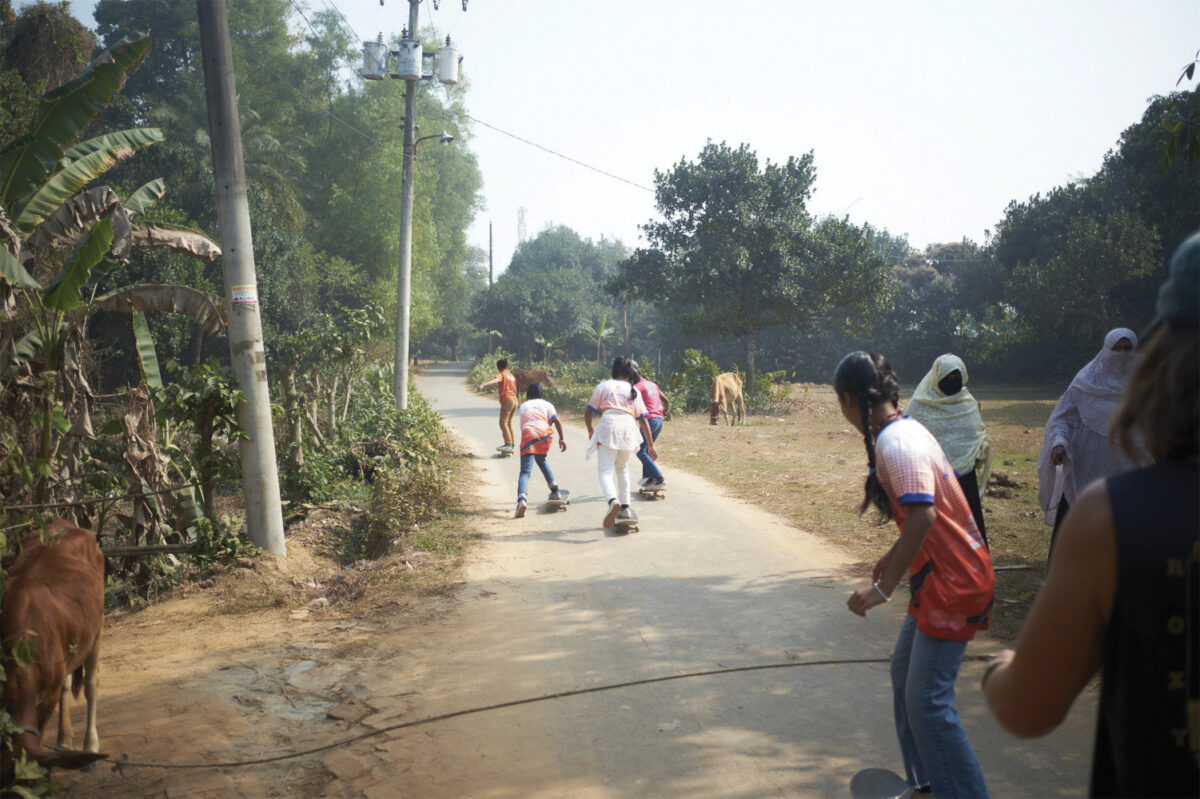
The great thing about BSKA’s mission is that it doesn’t acknowledge a distinction between alleviating poverty and having fun. One of Halsell’s long-term goals is for Bangladesh to field a skateboarding team in the Olympics. Halsell is pushing for skateboarding to become more well-known so that the country builds more high-quality skateparks and hosts more national-level competitions. “That’s huge for [the kids] to go from living under a bridge on the streets directly to being handed awards by a government official,” Halsell says. The most important thing, she stresses, is that they are having fun and learning social skills. According to Halsell, many of the students who go through the BSKA programs transform from being “total outcasts, permanently on the streets, to being back in school and reconnected with their families.”
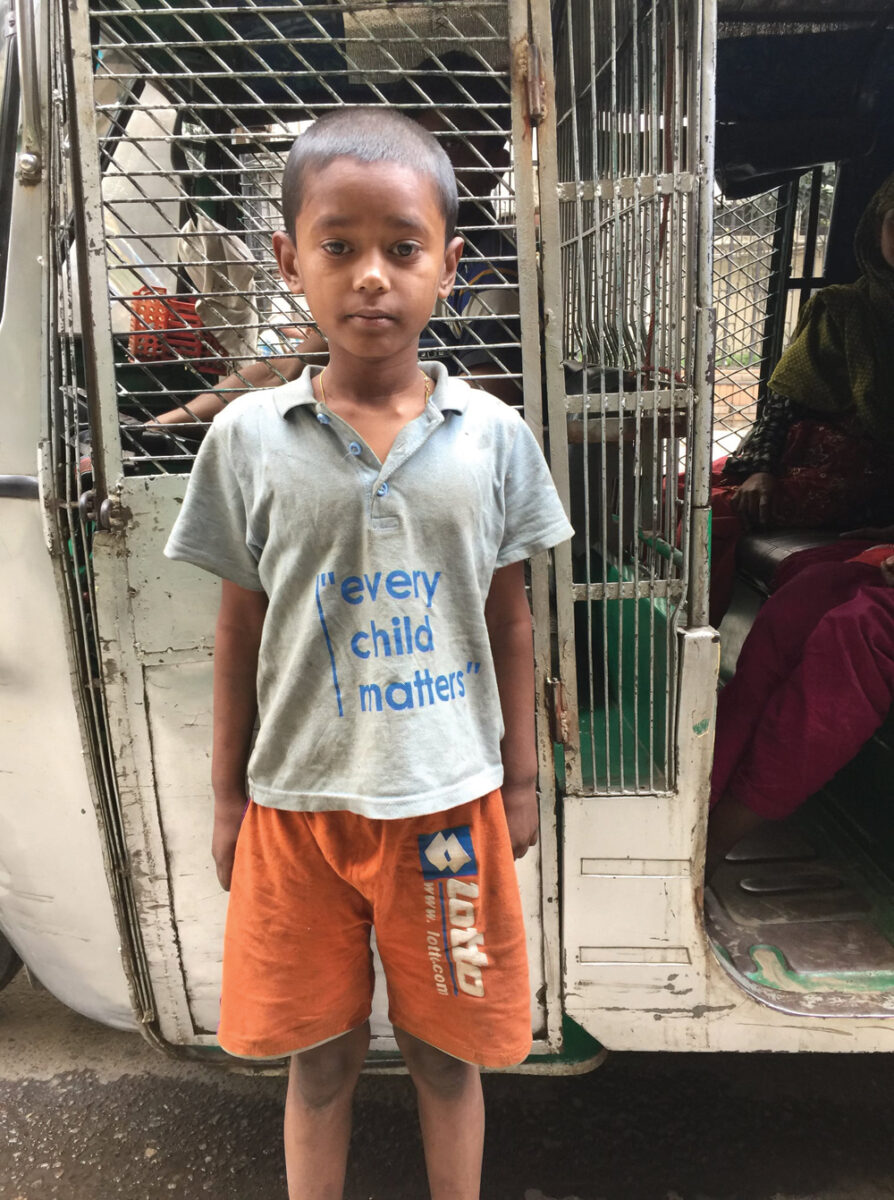
Many children are helped by these programs, but Halsell recalls one child with extra emotion and pride. Halsell met this child, Sabina, when she was only seven years old. (Her name has been changed to protect her privacy.) Despite her extreme youth, this child was already engaging in actions like huffing glue and cutting herself. She was also disguising herself as a boy for safety reasons. Halsell once found her passed out at the top of a staircase; another time, in the middle of a road.
Sabina came to Halsell’s skateboarding program and lived in the transitional home Halsell was running at the time. Halsell played a major role in raising Sabina as she went through adolescence and puberty. Freed of the stress of extreme poverty, Sabina got to enjoy skating and doing other kid things; she grew to love burgers, fries, and Coke. Halsell’s program also taught her social skills, leadership, boldness, and confidence.
Today, Sabina works for Halsell as one of the skateboarding coaches. She emulates Halsell so much that people call her “The Manager.” Halsell says, “The girls love learning from her, [and] she loves the kids.” Sabina has grown into a leader capable of helping others. As Halsell explains, “She’s pretty much managing that program with three of our other girls right now.”
Rather than donating money, Halsell urges people who are moved by her work in Bangladesh to travel there, so that they can see the level of poverty for themselves—and also see how lovable the kids are, and how much need there is for more privileged people to help others. Traveling completely changed her as a person, and she has faith that it can change others as well. As she puts it, “I just feel like going to places like Bangladesh helps people rethink what their purpose is on the planet.”
Halsell herself has had a number of experiences that altered her life forever. One memory in particular stands out. This was 2014, and she was living near a garment factory. One day the factory collapsed with the workers inside. “We smelled the dead bodies for two weeks straight,” she says. “Then [rescue teams were] trying to pull people out, seeing the rubble, just rebar and clothes and broken concrete…” In a Zoom interview a decade after the tragedy, she trails off as she remembers this horrible scene. Then she adds, “Yeah, I think Americans throw away like sixty pounds of clothes a year on average, probably a lot more for some people.”
For Halsell, this kind of knowledge and awareness of the impacts of our world systems is something we must expand. “Even if people can’t travel there,” she says, “they can make better decisions.”
The country of Bangladesh has faced many challenges in the last four hundred years. Starting in 1793, England colonized it through the East India Company and the British Raj. When the colonizing forces finally withdrew in 1951, the present-day borders of Bangladesh were drawn, but it was merely a province in Pakistan—the Muslim-majority country carved out of India through what came to be known as Partition. For the next twenty years, as the province of East Pakistan, the territory was ruled by a government that made its capital on the other side of India. Finally, in 1971, Bangladesh became its own country.
Since independence, Bangladesh has made strides in alleviating poverty but has also struggled to maintain a democratic system of government. In the summer of 2024, student-led protests of a contentious job quota system resulted in a national rebellion that successfully overthrew the nation’s autocratic ruler, Sheikh Hasina. The daughter of Bangladesh’s first president, she had been in power for 20 years.
During the recent uprising, Halsell was in Bangladesh. Because Halsell had recently started a position spearheading UNICEF’s Skateboarding and Surfing Sport for Development initiatives in Bangladesh, she was on “work from home” lockdown status. Halsell recalls, “I watched the protesters pouring through the streets from my rooftop with a heart full of hope and relief that the country would be free from the persistent oppression and corruption on all levels of government.”
She imagined skateboarding down the streets, proudly flying a Bangladesh flag, but instead she watched for hours from the roof as millions of protesters marched toward the Prime Minister’s residence. People tossed food and water down to the protesters, who had been walking for hours in the heat. Later, Halsell witnessed Sheikh Hasina’s helicopter taking off and fleeing the country. As she says, “It was wild and very surreal!”
It should be a requirement, says Halsell, for “kids after high school to go travel to developing countries.” In her case, at least, that first trip to Bangladesh completely changed the course of her life, and the lives of so many others. “All I’ve done is for the kids,” Halsell says. She encourages others to go out and work on making a positive impact. “Think about a cause you care about and go for it,” she says. “There’s so much to be done in the world.”
